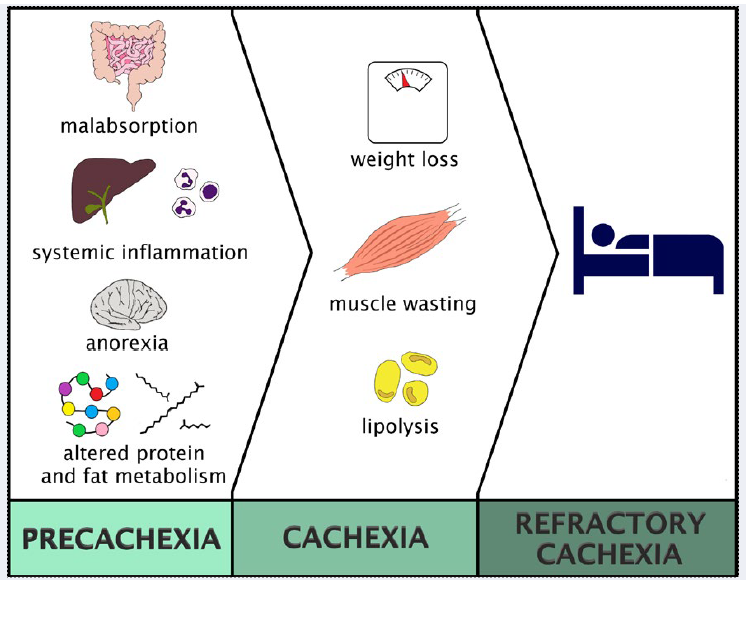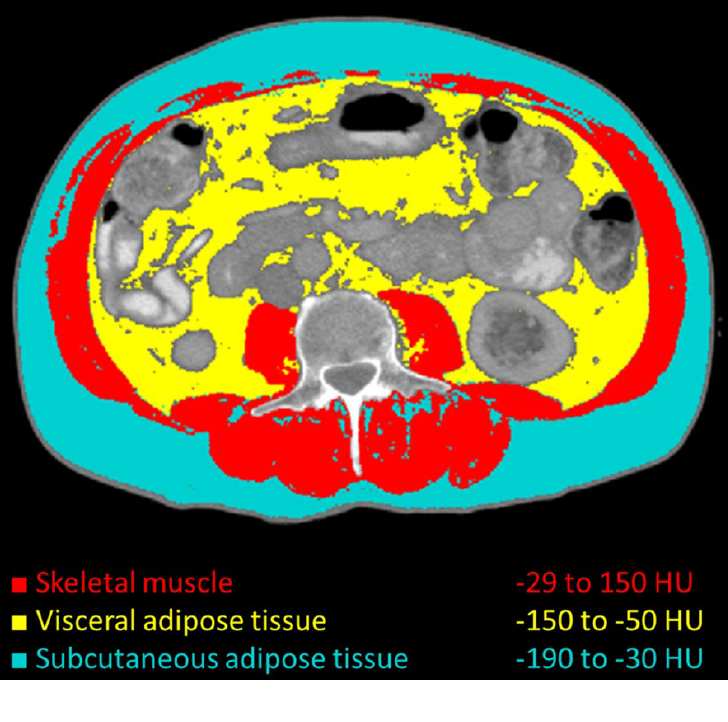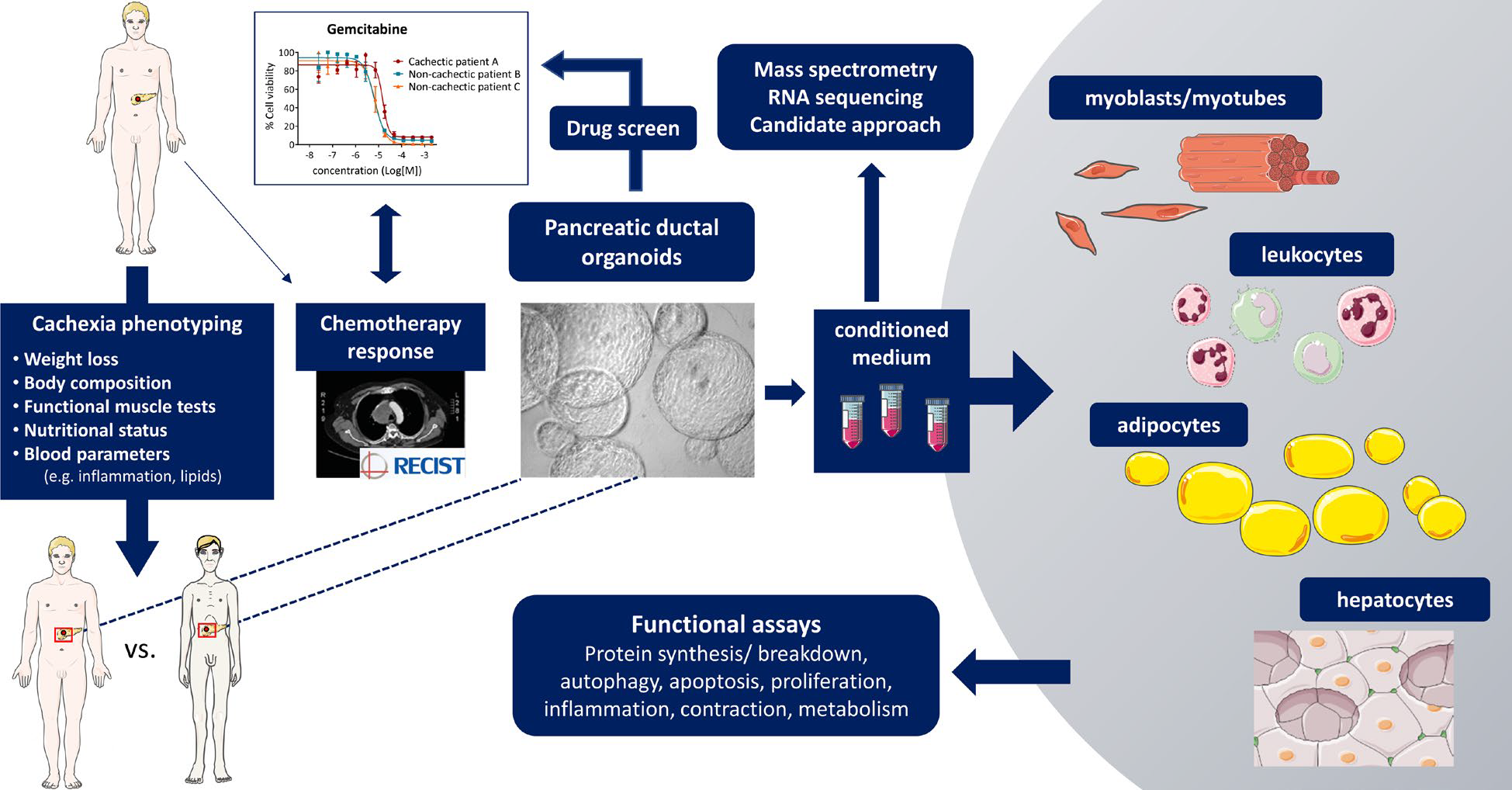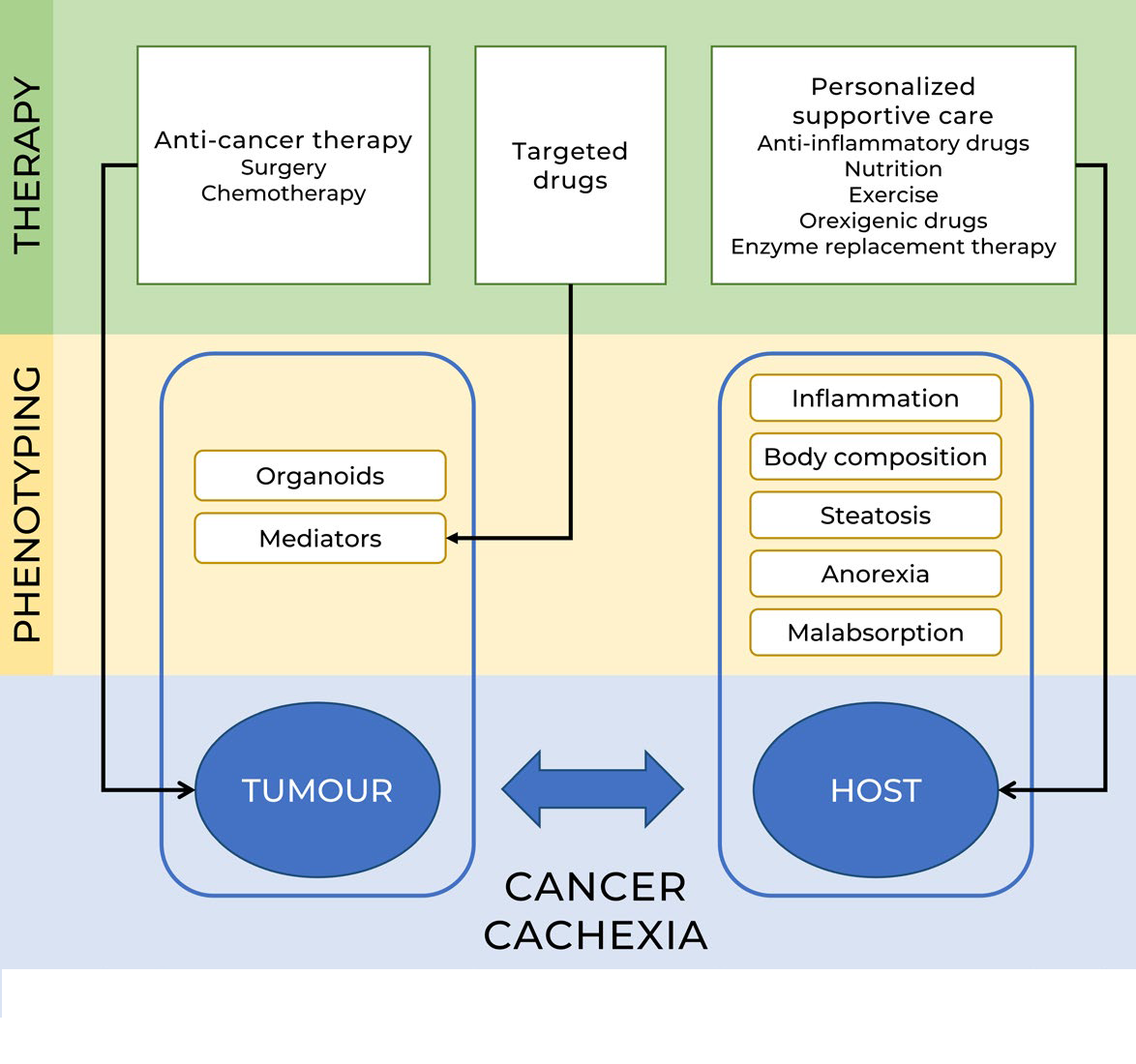Cancer Cachexia: the impact of a tumor on the body of patients
Division 2: Liver and Digestive Health
Department of Gastroenterology - Hepatology, MUMC+
Background
Our research focuses on cancer cachexia, a metabolic syndrome characterized by involuntary weight loss and loss of muscle mass in cancer patients (Figure 1).

Cancer cachexia has a severe negative impact on survival and quality of life. Our research starts from relevant observations made in patients and their tissues, which form the basis for mechanistic studies. This involves the development of innovative organoid models of pancreatic cancer and investigation of numerous cachexia-related parameters in patients with pancreatic cancer, breast cancer, ovarian cancer, colorectal cancer or lung cancer to identify common as well as cancer-specific disease drivers. Diagnosing cachexia is challenging because patient reported weight loss is often unreliable. Recent technological advances enable accurate real-time monitoring of weight loss and habitual physical activity. These ‘patient-recorded integrated measurements’ (PRIMs) help us to establish a more accurate prognosis and support personalization of treatment. We also put effort into body composition assessment focusing on skeletal muscle mass and quality and adipose tissue volume of patients by analysis of CT (Figure 2).

Furthermore, we initiated the construction of an advanced clinical research unit where patients can undergo deep phenotyping using state-of-the-art equipment focused on assessment of insulin sensitivity, muscle strength, and exercise capability.
Our specific research aims are to:
- develop novel tools for objectively assessing cachexia severity;
- identify host phenotypes of cachectic patients that predispose to adverse outcome;
- relate tumor organoid characteristics to host phenotypes;
- identify tumor-derived mediators responsible for tissue loss and dysfunction in cachexia;
- show the importance of the tumor stroma for the development of cancer cachexia.
- understand the link between cachexia and chemotherapy resistance;
- assess smooth muscle dysfunction in cachexia;
- evaluate the role of gut bacteria in cachexia.

Major breakthroughs
We are the first to apply organoids for identifying novel tumour-derived factors that cause the metabolic aberrations underlying cancer cachexia (Figure 3). In this context, we have developed a living biobank with a uniquely extensive characterization of the patients who contributed the organoids, which is made freely available to other researchers. We have applied these organoids to not only study the impact of tumour factors on skeletal muscle, the traditional focus of cachexia researchers, but also on smooth muscle and immuno metabolism of leukocytes.
Furthermore, we transplanted tumour organoids into mice, providing a novel avatar model of human cachexia. This has provided important novel insights to the field, such as the increased basal respiration in macrophages, the accelerated myogenic differentiation of skeletal muscle cells, and the switch to a synthetic phenotype by smooth muscle cells after exposure to tumour organoid factors.
We have also advanced the body composition analysis field by showing that combining several body composition parameters and information on systemic inflammatory factors is more predictive of patient survival than tumour stage. In addition, we showed that ectopic fat deposition in liver and muscle are independent predictors of survival and infectious complications after surgery. We are actively implementing radiomics and developing automated CT-based body composition algorithms. Furthermore, our analyses of the microbiome of cancer patients in relation to their cachexia status is unique and has yielded the information that is required to develop a prebiotic intervention, which could represent a novel means of nutritional support for cancer patients. Finally, we have applied our long-standing expertise in stable isotope tracing approaches to study protein metabolism in various organs in cachectic cancer patients, showing that tumour protein synthesis is quantitatively lower than protein synthesis of surrounding healthy pancreatic tissue as well as of muscle and adipose tissue.
Users and collaborations
Since the start of this research line in 2012, we have firmly established our position within the cachexia research field. Our work is recognized worldwide as evident from collaborations with many world-class scientists, including Prof. Dave Tuveson (USA) and Dr. Sylvia Boj (NL), the pioneers in the pancreatic tumor organoid field, and with Prof. Vickie Baracos (Canada) and Prof. Paola Costelli (Italy), leading cancer cachexia scientists. Important collaborations in the pancreatic cancer field include those with Prof. David Chang (UK) and Dr. Richard Skipworth (UK). We collaborate closely with Prof. Thorsten Cramer (Germany) in the context of tumour metabolism. We are among the initiators of the newly formed preclinical Dutch Pancreatic Cancer Group, an assembly of scientists who perform basic research on pancreatic cancer, embedded in the clinically focused Dutch Pancreatic Cancer Group. Internally, we collaborate actively with groups in other NUTRIM divisions (Annemie Schols/Ramon Langen, Luc van Loon, Patrick Schrauwen). In addition, we have joined forces with Danone Nutricia to assess the role of the gut microbiota in cancer cachexia and to develop a prebiotic intervention for supporting the gut microbiota. Furthermore, we have an active collaboration with Cell Guidance Systems to develop a novel growth factor platform for advancing organoid culture systems.
Who is involved?
P.I.s Steven Olde Damink, Sander Rensen.
Our research is the result of a true team effort where input from surgeons, oncologists, nurse practitioners, basic researchers, laboratory technicians, and PhD students is integrated in translational studies with a close eye on ultimate clinical benefit for patients (Figure 4, below).
Surgeons Ulf Neumann, Ronald van Dam, Kees Dejong, Marielle Coolsen, Stefan Bouwense, Anjali Roeth, Taco Blokhuis, and Marcel den Dulk as well as oncologists Judith de Vos-Geelen and Liselotte Valkenburg-van Iersel are crucial for inclusion and follow-up of patients and for collection of samples. Lieke Corpelijn and Bart Bongers perform essential functions in the physical and nutritional assessment of patients. Ralph Brecheisen and Leonard Wee are instrumental in applying radiomics and facilitate automated CT-based body composition analysis. A group of talented PhD students and technicians is essential for performing, analysing, and interpreting our clinical and laboratory studies.
These studies are only possible with financial and in-kind support from many sources, including the NWO NUTRIM Graduate Program, the Eurostars Program of EU Horizon 2020, the European Society for Clinical Nutrition and Metabolism, the European Institution of Innovation & Technology (EIT) Food4Health Program, the European Union Interreg fund for cross-border projects, and the Top Consortium for Knowledge and Innovation (TKI).

Scientific impact/Research quality
In the last five years, we have published many studies with high impact in the top journal of our field, the Journal of Cachexia, Sarcopenia, and Muscle (IF ~10). Examples are:
- Vaes RDW, van Dijk DPJ, Welbers TTJ, Blok MJ, Aberle MR, Heij L, Boj SF, Olde Damink SWM, Rensen SS. Generation and initial characterization of novel tumour organoid models to study human pancreatic cancer-induced cachexia. J Cachexia Sarcopenia Muscle. 2020;11(6):1509-1524.
- West MA, van Dijk DPJ, Gleadowe F, Reeves T, Primrose JN, Abu Hilal M, Edwards MR, Jack S, Rensen SSS, Grocott MPW, Levett DZH, Olde Damink SWM. Myosteatosis is associated with poor physical fitness in patients undergoing hepatopancreatobiliary surgery. J Cachexia Sarcopenia Muscle. 2019;10(4):860-871.
- van Dijk DPJ, Horstman AMH, Smeets JSJ, den Dulk M, Grabsch HI, Dejong CHC, Rensen SS, Olde Damink SWM, van Loon LJC. Tumour-specific and organ-specific protein synthesis rates in patients with pancreatic cancer. J Cachexia Sarcopenia Muscle. 2019;10(3):549-556.
- van Dijk DPJ, Krill M, Farshidfar F, Li T, Rensen SS, Olde Damink SWM, Dixon E, Sutherland FR, Ball CG, Mazurak VC, Baracos VE, Bathe OF. Host phenotype is associated with reduced survival independent of tumour biology in patients with colorectal liver metastases. J Cachexia Sarcopenia Muscle. 2019;10(1):123-130.
- van Dijk DP, Bakens MJ, Coolsen MM, Rensen SS, van Dam RM, Bours MJ, Weijenberg MP, Dejong CH, Olde Damink SW. Low skeletal muscle radiation attenuation and visceral adiposity are associated with overall survival and surgical site infections in patients with pancreatic cancer. J Cachexia Sarcopenia Muscle. 2017;8(2):317-326.
- van Dijk DP, van de Poll MC, Moses AG, Preston T, Olde Damink SW, Rensen SS, Deutz NE, Soeters PB, Ross JA, Fearon KCh, Dejong CH. Effects of oral meal feeding on whole body protein breakdown and protein synthesis in cachectic pancreatic cancer patients. J Cachexia Sarcopenia Muscle. 2015;6(3):212-21.
Our PhD students have won multiple prizes presenting this original work on different conferences, e.g. the best presentation award for Rianne Vaes at the 12th Congress of the Society of Sarcopenia, Cachexia and Wasting Disorders in Berlin in 2019, and a fellowship from the Living with Hope foundation for Merel Aberle in 2018.
Societal impact
We consider it very important to communicate our data and insights to fellow researchers and to the broader community. We partner with patient advocate organizations like Living with Hope and Inspire2live to ensure the inclusion of patient opinions in our research projects, thereby adding relevance to our work. We have organized a workshop on the use of organoids in translational research as part of the 11th Congress of the Society of Sarcopenia, Cachexia and Wasting Disorders. Our educational activities also include a recent contribution to the novel Textbook of Pancreatic Cancer Principles and Practice of Surgical Oncology (due March 8, 2021) on The Cachexia Syndrome in Pancreatic Cancer. We are actively working on implementation of our findings in the patient care paths of the Maastricht Comprehensive Cancer Centre.
Recently, our research activities have been picked up by regional and national newspapers, which allowed us to create awareness of the detrimental impact of cancer cachexia on the patient’s treatment outcome and quality of life. In addition, we are active in the valorisation of our research insights. We are among the founding members of Adjutec, a start-up that focuses on the development of a novel anti-cancer vaccination platform with an innovative adjuvant that promotes strong immune responses to patient-specific tumour targets.
Future perspectives
In the near future, we will focus on improving the characterization of cachexia severity in cancer patients by fully integrating the novel equipment and assessment tools that have come available within the clinical research unit into our translational research lines. We will start with an exercise-based intervention study to assess the feasibility of a prehabilitation approach for patients with pancreatic cancer, and determine the effect of training on the fitness of the immune system.